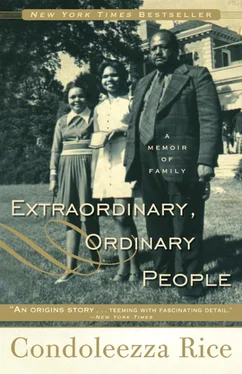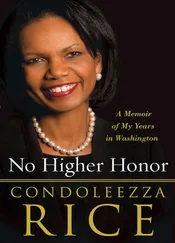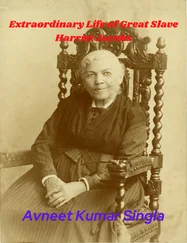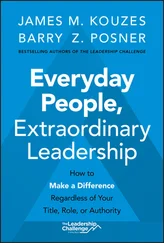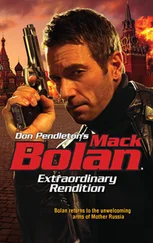In any event, with an eye toward reining in my less sociable tendencies, my parents began in 1959 to look for a good kindergarten in which to enroll me. The school system didn’t have kindergarten classes, but there were a few private alternatives; in fact, my father’s church had sponsored a kindergarten a couple of years earlier. Daddy decided to restart the program and recruited a retired teacher, Mrs. Louise Hunter, to teach the children. Mrs. Hunter was a member of Westminster and the widow of Frank Hunter, who’d helped my father register to vote in 1952.
The kindergarten program was largely academic, emphasizing reading, writing, and arithmetic. But there were also lots of fun activities as well, including stickball and singing. I loved kindergarten and eagerly went every day. I was a chubby little kid and sometimes bore the brunt of teasing about it. My head was kind of big, and some little kid started calling me “watermelon head.” I retaliated with a comeback that I can’t remember now, but in general, I got along better than expected with my classmates.
Florissa Lewis was my best friend in kindergarten. She remained so even after an incident that could have ended our friendship early. At the Easter program at church we were each assigned to deliver a speech. Mine was “Ring, Easter bells. Ring, ring, ring. Tell the glad tidings of Christ the risen King.” Florissa was supposed to follow with her own part. I don’t remember the words now, but I did on that day. When Florissa hesitated, I started delivering her speech too. My parents and hers were thoroughly embarrassed, but I thought I was just helping out.
After a year, we “graduated” from kindergarten in a ceremony complete with white robes and diplomas held in the church sanctuary. All of the other kids were on their way to first grade, but I wasn’t. I was very sensitive about this and didn’t want the other children to know. The problem was that I would not turn six until November, too late to meet the October 31 cutoff set by the school system.
My parents were determined to see that I not miss an entire year of school. They tried to get the school system to count my time in kindergarten and let me test into first grade. The Board of Education would not budge, so they came up with another idea. Perhaps I could test into second grade the following year. Having received permission for this unusual maneuver, they set about making certain that I would pass the test.
My mother decided to take a year’s leave from teaching to coach me in preparation for the exam. Years later when the homeschooling movement became more visible, I belatedly realized that I had been a part of it, if only in an ad hoc way. Mother was very systematic about my school day. We’d get up and see Daddy off to work and then start “school.” She ordered the first- and second-grade texts in math, science, and reading and took me through them in a very rigorous fashion. I’d take tests every week to chart our progress. This flexible schedule also allowed time to practice piano, and as a result, I advanced significantly during this period.
Occasionally, if I did well in my schoolwork, we would knock off a little early and go shopping in downtown Birmingham. One such trip yielded my first Barbie doll, dressed in the iconic black and white zebra-striped bathing suit. But for the most part, my mother was all business and very demanding.
I didn’t mind having my mother teach me at home, except for one thing: I wanted to be like the other kids, who would go to school every morning and come home at the end of the day. I felt so different, and I hated it. So I invented a story that I was going to another school outside the community. Each morning as the kids were leaving, I’d get my books and go outside, pretending to wait for a ride to school. When they returned, I’d “come home.” This subterfuge didn’t last long because the other kids began to ask too many questions about my other school. My parents didn’t particularly like this deception, including the desire to “fit in,” and convinced me that I had to tell the truth. So I admitted to my friends that I was studying at home. “Next year,” I proclaimed, “I will be in second grade!” I was very proud when I passed the test, scoring at a third-grade level in arithmetic and at a fifth-grade level in reading. I entered Lane Elementary School as a six-year-old second grader.
Though my neighborhood school was Center Street Elementary, I was enrolled in Lane Elementary because it was across the street from Ullman High, where Daddy worked. He would drop me off and then, at the end of the shorter elementary school day, leave work early and pick me up. After that I’d stay with him, doing my homework in his office (he was the guidance counselor) and getting to know the “big kids.”
After launching me academically, Mother returned to work. Each morning she’d carpool to school with other teachers. She had received a credential to teach science and was assigned to Western-Olin High School. Parker High School was the flagship black school, located in mostly middle-class Smithfield. Ullman High School was the other prized place to work, located a few blocks from our house in middle-class Titusville.
Western-Olin was located in Ensley, squarely in the middle of steel-mill country and known as tough territory. The students were mostly from the publicly run housing projects, and violence inside and outside of school was frequent. Even in those days there were a fair number of single mothers and children being raised by grandparents. Ensley was not considered a desirable place to work. I remember my father’s concern about Mother working in such a tough environment.
Western-Olin was one of two schools that had a divided curriculum. Some students attended Western, the academic high school, full-time, while others would complete a half day of academics and spend the balance of the afternoon in vocational programs at Olin. The campuses were in the same place, but it was as if the students lived in parallel universes. The vocational school students were seldom encouraged to even think of attending college; they were just expected to acquire minimal competence in reading and arithmetic and then specialize in a skill such as cosmetology or auto mechanics.
Mother believed that the vocational kids weren’t taken seriously enough and that this, in part, produced the behavior problems that were so prevalent. She went out of her way to serve these kids, making some her “assistants” and giving them tasks such as cleaning the science lab so that they’d feel their contributions were valued. She would then make sure that they received certificates at graduation. These kids likely would have received no honors at graduation but for those that my mother invented. I remember one student in particular, a young woman who was tall and heavyset with dyed flaming-red hair, who had built a track record of chronic behavioral issues. Each day she would come to work for Mother, eventually becoming trusted enough to open and close the science lab with her own key. She and my mother cried when she graduated, having beaten the odds that were so clearly stacked against her.
Mother also believed that the arts could make a difference for these kids and for this underprivileged community as a whole. In 1962 she decided to produce a full-scale operetta with the students. The kids performed Chenita , which used Franz Liszt’s music to tell the story of a Gypsy family. The next year they were much more ambitious and performed George Gershwin’s Porgy and Bess .
Rehearsals would start just after Christmas for a performance in the spring. Parents were required to buy the material for the costumes, which were made in sewing classes. If a student couldn’t afford the fabric, the teachers pitched in and purchased it. The scenery was made in the carpentry shop.
Читать дальше
